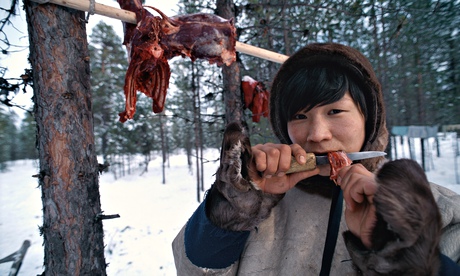Benny Wenda from the highlands of West Papua speaks only nine languages these days. In his village of Pyramid in the Baliem valley, he converses in Lani, the language of his tribe, as well as Dani, Yali, Mee and Walak. Elsewhere, he speaks Indonesian, Papua New Guinean Pidgin, coastal Bayak and English.
Wenda has known and forgotten other languages. Some are indigenous, spoken by his grandparents or just a few hundred people from neighbouring valleys; others are the languages of Indonesian colonists and global businesses. His words for "greeting" are, variously, Kawonak, Nayak, Nareh, Koyao, Aelak, Selamt, Brata, Tabeaya and Hello.
New Guinea has around 1,000 languages, but as the politics change and deforestation accelerates, the natural barriers that once allowed so many languages to develop there in isolation are broken down.
This is part of a process that has seen languages decline as biodiversity decreases. Researchers have established a correlation between changes in local environments – including the extinction of species – and the disappearance of languages spoken by communities who had inhabited them.
"The forests are being cut down. Many languages are being lost. Migrants come and people leave to find work in the lowlands and cities. The Indonesian government stops us speaking our languages in schools," says Wenda.
According to a report by researchers Jonathan Loh at the Zoological Society of London and David Harmon at the George Wright Society, the steep declines in both languages and nature mirror each other. One in four of the world's 7,000 languages are now threatened with extinction, and linguistic diversity is declining as fast as biodiversity – about 30% since 1970, they say.
While around 21% of all mammals, 13% of birds, 15% of reptiles and 30% of amphibians are threatened, around 400 languages are thought to have become extinct in the same time.
New Guinea, the second-largest island in the world, is not just the world's most linguistically diverse place, it is also one of the most biologically abundant, with tree-climbing kangaroos, birds of paradise, carnivorous mice, giant pigeons, rats bigger than domestic cats and more orchid species than any other place on the planet.
Today, both its wildlife and its languages are endangered. According to linguist and author Asya Pereltsvaig, the language of Bo is spoken by 85 people, Ak by 75 and Karawa by only 63. Likum and Hoia Hoia have around 80 speakers, and Abom just 15. Guramalum in New Ireland Province had at the last count only three speakers and Lua is almost certainly extinct, with a single speaker recorded in 2000.
Ironically, Lua is now the name of a successful computer programming language.
More than half of New Guinea's and one in four of the world's remaining languages are threatened, says Jonathan Loh. This compares with estimates that suggest a quarter of all mammals, a third of all sharks and rays and one in seven bird species are endangered.
"There are extraordinary parallels between linguistic diversity and biodiversity," says Loh. "Both are products of evolution and have evolved in remarkably similar ways, and both are facing an extinction crisis."
But exactly why there should be such a close link between languages and biological diversity is unclear, even though it was noticed by Darwin. "Places of high diversity, especially tropical forests, have always been known to have high linguistic diversity, whereas tundra and deserts have low diversity," says Loh. "It is possible in some way that higher biodiversity is capable of supporting greater cultural diversity. The explanation seems to be that both biological and cultural diversity depend on the same environmental factors such as temperature and rainfall."
Conservationists fear that the loss of species due to man's activities is accelerating. And linguists say that the wealth of the world's human languages is now safeguarded by very few indigenous peoples, most of whom live precarious lives in developing countries.
Of the 7,000 languages spoken worldwide, half now have fewer than 10,000 speakers, and these 3,500 languages are spoken by only 0.1% of the world's population – equivalent to a city about the size of London. These eight million people are now responsible for keeping the wealth of human cultural history alive, says the report.
At the other end of the spectrum, because of colonisation, globalisation and the worldwide move to cities in the last 30 years, a handful of global languages increasingly dominates: 95% of the world's population speaks one of just 400 languages, each spoken by millions of people, and 40% of us speak one of just eight languages: Mandarin, Spanish, English, Hindi, Portuguese, Bengali, Russian and Japanese.
"We are losing the richness of human diversity, becoming more and more similar. The languages we speak define how we think and understand the world," says Mandana Seyfeddinipur, director of the endangered languages archive at the School of Oriental and African Studies, University of London.
"The loss of human culture is frightening," says Loh. "Nearly all the threatened languages are spoken by indigenous peoples and, along with the languages, the traditional knowledge of these cultures is being forgotten. The names, uses, and preparation of medicines, the methods of farming, fishing and hunting are disappearing, not to mention the vast array of spiritual and religious beliefs and practices which are as diverse and numerous as the languages themselves."
Loh and Harman argue that if you want to save nature it may be vital to conserve cultures too. "The vast store of knowledge that has evolved and accumulated over tens of thousands of years could be lost in the next 100 years," says Harman. "While linguists have made efforts to archive as many of the endangered languages as possible, and ethnobiologists have attempted to record the traditional use of plants, the most important conservation takes place on the ground as part of a living culture."
"As we lose rare indigenous languages we lose the cultures and all the knowledge that they contain. The knowledge of indigenous people is phenomenal. Conservationists should make use of it," says Loh.
The authors have developed an "index of linguistic diversity" which shows that the fastest declines have taken place in the Americas and Australia. Languages spoken in Africa, Asia and Europe are faring better. For biodiversity, the fastest rates of decline have occurred in the Indo-Pacific region, Latin America and sub-Saharan Africa.
"Species populations in North America, Europe and northern Asia have been more stable. Biodiversity has declined most rapidly in the tropics, but remained steady in temperate regions.
"However, linguistic diversity has declined rapidly in the new world [Americas] but more slowly in the old world," says Harman.
The explanation for the different speeds of decline, they say, lies with the threats that both languages and species face. "Habitat loss and degradation is the greatest threat for species, and since 1970 most has taken place in the tropics. In the developed world most habitat destruction took place before 1970, so biodiversity loss has flattened out.
"Languages do not usually go extinct because an entire population of speakers dies out, but because the speakers of a minority, usually indigenous, language shift to a more dominant language and, typically within a few generations, lose their mother tongue.
"Migration, urbanisation and national unification policies have been the primary drivers of language shift in Africa, Asia and Europe. In the Americas and Australia, the primary driver has also been migration, but where the migrants, mainly European, greatly outnumbered the indigenous populations.
"Ultimately both biodiversity and linguistic diversity are diminishing as a result of human population growth, increasing consumption and economic globalisation which are eroding the differences between one part of the world and another," says the report.
Benny Wenda says the link between human culture and biodiversity is clear because it is the indigenous peoples of the world who have mostly conserved nature.
"If you fell the trees then you destroy human culture as well as the birds of paradise. People depend on the forest and the forest has always depended on us. We are as one."










